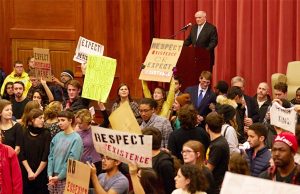In this weekend’s Wall Street Journal Review section, Dr. Laurie I. Patton, President of Middlebury College and a scholar of South Asian history, culture and religion, addressed the issue of free speech on college campuses and pulled out five takeaways educational institutions have an obligation to foster during these emotional days.
Those are as follows, according to Dr. Patton:
- “Embrace freedom of expression and inquiry as an educational value for everyone, regardless of their background or political views.” Controversial speech is especially difficult at a time when issues that should be addressed and debated become the exclusive province of the left or the right. In our current state of high tension, it is hard to explore vital, fraught topics such as the history of oppression or the nature of freedom, but we have a responsibility to teach and discuss them openly and honestly, with mutual respect.
- “Move beyond the false dichotomy between free speech and inclusiveness.” Our dual commitment to free expression and to making all students full members of our communities must be embraced fiercely and with conviction. But an educational institution does not become more inclusive by limiting freedom of expression. Nor does it achieve greater freedom by reducing its commitment to building an inclusive, robust, brave public square where all students are equally welcomed and valued.
- “Let students know that, when these values come into conflict, as they did at Middlebury this past spring, educational institutions have a primary obligation to foster open and civil discourse.” Schools have to be prepared to enforce this commitment, as we did in this episode. Free speech lies at the heart of our purpose as an institution, and we cannot allow force or disruption to undermine it.
- “Ensure that students have a basic understanding of the First Amendment and its history as well as of historical and current models for creating a more inclusive public square.” It is essential to include such topics in student orientations and to ask them to reflect on them at regular intervals throughout their careers.
- “Prepare students for our polarized politics by actively acknowledging and learning about the full range of perspectives on the important issues of the day.” Faculty should regularly ask themselves and their students if anyone is afraid to speak about his or her views—including conservative students, who tell us that they often feel alienated in the classroom and social settings of left-leaning campuses.
- “Reflect on who is and is not included in different public debates, and ask why. Many students from underrepresented groups tell us that they get the message every day that they do not belong at elite colleges.” Are there ways to create new traditions of dialogue and argument that can expand the definition of who belongs? Our public square must be as energetically invitational as it is educationally rigorous.
I felt that Dr. Patton’s contribution was an integrous way to approach the subject I had addressed in my CF100 post on May 15, 2017.
Click here for the link to Dr. Patton’s article published on WSJ.
Image credit: Vermontbiz.com

